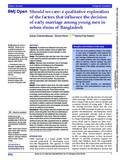| dc.contributor.author | Biswas, Subas Chandra | |
| dc.contributor.author | Karim, Shuchi | |
| dc.contributor.author | Rashid, Sabina Faiz | |
| dc.date.accessioned | 2022-05-23T08:38:08Z | |
| dc.date.available | 2022-05-23T08:38:08Z | |
| dc.date.copyright | 2020 | |
| dc.date.issued | 2020-10-26 | |
| dc.identifier.citation | Biswas, S. C., Karim, S., & Rashid, S. F. (2020). Should we care: A qualitative exploration of the factors that influence the decision of early marriage among young men in urban slums of Bangladesh. BMJ Open, 10(10) doi:10.1136/bmjopen-2020-039195 | en_US |
| dc.identifier.uri | http://hdl.handle.net/10361/16654 | |
| dc.description | This article was published in BMJ Open by BMJ Journals [© Author(s) (or their employer(s)) 2020. Re-use permitted under CC BY-NC. No commercial re-use. See rights and permissions. Published by BMJ.] and the definite version is available at: http://dx.doi.org/10.1136/bmjopen-2020-039195 The Journal's website is at: https://bmjopen.bmj.com/content/10/10/e039195 | en_US |
| dc.description.abstract | Objectives To explore how adolescent and young men
negotiate the complex realities of lives to explain their
pathways into and reasons for early marriage in urban
slums of Bangladesh.
Design The qualitative data used here came from a larger
3-year study that used both quantitative and qualitative
research methods.
Setting Interviews were conducted in two of the largest
slums in Dhaka and Chittagong city of Bangladesh
between December 2015 and March 2018.
Participants This paper uses qualitative data from 22 indepth interviews (IDIs) and three focus group discussions
(FGDs) with adolescent and young men aged 15–24 years;
13 IDIs and 4 FGDs with parents and 11 key-informant
interviews with community leaders. The purposively
selected respondents were interviewed in their respective
settings.
Results In the context of urban slums, this study revealed
multiple factors influence early marriage decision-making
processes among young men. These factors include
socially perceived phenomenon of adulthood and readiness
of marriage, poverty leading to drop out from schools and
early initiation to earning livelihood, manifestations of
increasing individual aspiration and agency, fulfilment of
romance and erotic desires and dreams of forming one’s
own family. In addition, parental and immediate societal
interference to preserve norms around gender and society
can act as catalysts for this decision.
Conclusions Study findings imply that complex structural
factors, social and gender norms that are contributing to
the early marriage for both adolescent boys and young
men in Bangladesh’s urban slums. These are locations
where conservatism, poverty and urbanisation intersect
resulting in early and often unprepared entry to adulthood
for young men impacting on their development and wellbeing. It is, therefore, critical that young men should be
included in the national and global conversations around
child marriage and child marriage prevention programme. | en_US |
| dc.language.iso | en_US | en_US |
| dc.publisher | BMJ Journals | en_US |
| dc.relation.uri | https://bmjopen.bmj.com/content/10/10/e039195 | |
| dc.subject | Early marriage | en_US |
| dc.subject | Young men | en_US |
| dc.subject | Urban slums of Bangladesh | en_US |
| dc.subject | A qualitative exploration | en_US |
| dc.title | Should we care: A qualitative exploration of the factors that influence the decision of early marriage among young men in urban slums of Bangladesh | en_US |
| dc.type | Journal Article | en_US |
| dc.description.version | Published | |
| dc.contributor.department | Brac James P. Grant School of Public Health | |
| dc.identifier.doi | http://dx.doi.org/10.1136/bmjopen-2020-039195 | |
| dc.relation.journal | BMJ Open | |

